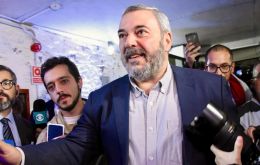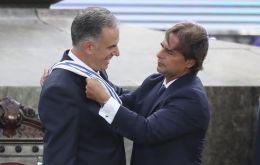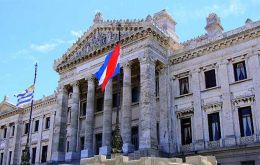MercoPress. South Atlantic News Agency
Tag: Uruguay elections
-
Monday, May 12th 2025 - 10:59 UTC
Uruguay’s municipal elections: National Party dominates, Frente Amplio retains Montevideo

Uruguay’s 2025 municipal and departmental (provincial) elections concluded with results reinforcing the country’s traditional political landscape. The left-wing Frente Amplio retained its stronghold in Montevideo and Canelones, while the center-right National Party (Partido Nacional) maintained its dominance across most rural regions, securing a total of 13 departments.
-
Sunday, May 11th 2025 - 23:50 UTC
Former Uruguayan President José Mujica misses municipal election day due to health concerns

Former Uruguayan President José “Pepe” Mujica, a global icon of humility and leftist politics, did not participate in Sunday’s municipal elections due to serious health issues. The 88-year-old former leader, known for his austere lifestyle and philosophical reflections, remained at his rural home west of Montevideo.
-
Saturday, March 1st 2025 - 22:46 UTC
A new era in Uruguay: Yamandú Orsi takes the Presidential sash

Former mayor of Canelones and history professor Yamandú Orsi took the stage at Plaza Independencia, the heart of Uruguay’s democratic transitions. A warm embrace with outgoing President Luis Lacalle Pou marked the handover, a moment of continuity in a country that takes pride in its institutional stability. “I’m here if you need me,” Lacalle Pou told Orsi, offering a rare glimpse of camaraderie in the often-divisive world of politics.
-
Monday, November 25th 2024 - 11:19 UTC
Yamandú Orsi elected President of Uruguay, marking left's return to power

Uruguay has elected Yamandú Orsi of the Frente Amplio (FA) as its next president, bringing the left back to power after five years of conservative rule. Orsi secured 49.8% of the vote against 45.9% for Álvaro Delgado of the National Party, a margin of 92,000 votes, according to official results. The outgoing president, Luis Lacalle Pou, promptly congratulated Orsi, stating he was ready to facilitate a smooth transition.
-
Friday, November 1st 2024 - 17:10 UTC
Lacalle Pou hints at possible return in 2029, talks about regional relations

Uruguayan President Luis Lacalle Pou, months from completing his term, hinted at a possible return in the 2029 presidential election but left the door open.
-
Monday, October 28th 2024 - 10:55 UTC
Uruguay’s Presidential race heads to runoff as Orsi's Frente Amplio leads first round

Uruguay’s leftist Frente Amplio (FA) secured the top position in the first round of the presidential election. Yamandú Orsi, the FA candidate and former mayor of Canelones, led the race with 43.4% of the vote, propelled by support from former president José “Pepe” Mujica. However, he fell short of the majority threshold needed to avoid a runoff, and a second round is now scheduled for November 24. Orsi’s opponent in the runoff will be Álvaro Delgado, the National Party (PN) candidate, who garnered 27.2% of the vote and leads a coalition of center-right and right-wing parties that include the Colorado Party and Cabildo Abierto.
-
Sunday, October 27th 2024 - 21:55 UTC
Uruguay's 2024 Election: Voter turnout reaches 40% by midday, anticipating a close race

As Uruguayans head to the polls this October 27 to elect their president, vice-president, and Parliament, preliminary reports from the Electoral Court indicate a steady turnout. By midday, 40% of the 2,727,120 eligible voters had cast their ballots across the country's 7,276 polling circuits. Voting is mandatory in Uruguay, with those abstaining required to pay a fine or present a valid excuse, such as illness, disability, or international travel.
-
Thursday, October 24th 2024 - 11:05 UTC
What the polls say three days before the presidential elections in Uruguay

Uruguayans will head to the polls on October 27 to elect a successor to President Luis Lacalle Pou and renew the country's Parliament. According to the latest surveys, no candidate is expected to secure the required 50% of votes, setting the stage for a November runoff.
-
Monday, October 21st 2024 - 10:56 UTC
Uruguay: Mujica makes last public political appearance

Battling esophageal cancer and age, former Uruguayan President José “Pepe” Mujica made what is believed to be his last public appearance this past weekend by showing up at a rally of “La 609” or MPP, the Broad Front (FA) faction he once founded. “Goodbye, I give you my heart,” Mujica stressed on Saturday during a campaign closing event a week before the Oct. 27 elections.
-
Monday, October 14th 2024 - 17:47 UTC
In a dull campaign and dull candidates, Uruguay votes new president and parliament on Sunday October 27

In less than two weeks time, Sunday 27 October, 2,8 million Uruguayan voters will be electing a new president, and a new parliament, 99 Lower House members and 30 Senators for the 2025/2030 period.
